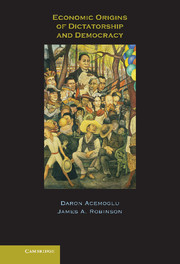Book contents
- Frontmatter
- Contents
- Preface
- PART ONE QUESTIONS AND ANSWERS
- 1 Paths of Political Development
- 2 Our Argument
- 3 What Do We Know about Democracy?
- PART TWO MODELING POLITICS
- PART THREE THE CREATION AND CONSOLIDATION OF DEMOCRACY
- PART FOUR PUTTING THE MODELS TO WORK
- PART FIVE CONCLUSIONS AND THE FUTURE OF DEMOCRACY
- PART SIX APPENDIX
- Bibliography
- Index
3 - What Do We Know about Democracy?
Published online by Cambridge University Press: 05 September 2012
- Frontmatter
- Contents
- Preface
- PART ONE QUESTIONS AND ANSWERS
- 1 Paths of Political Development
- 2 Our Argument
- 3 What Do We Know about Democracy?
- PART TWO MODELING POLITICS
- PART THREE THE CREATION AND CONSOLIDATION OF DEMOCRACY
- PART FOUR PUTTING THE MODELS TO WORK
- PART FIVE CONCLUSIONS AND THE FUTURE OF DEMOCRACY
- PART SIX APPENDIX
- Bibliography
- Index
Summary
In this chapter, we provide an overview of previous research on democracy. We depict some of the most salient “stylized facts” about democracy that have been emphasized and much debated in the literature. Because a reevaluation of the existing empirical evidence is not our main focus, we present these patterns diagrammatically without using formal econometric techniques. Although these patterns may not correspond to causal relationships, they are still informative about the correlates of democracy in the data, thus potentially informative about the type of models we should develop. In the final two sections we discuss the existing approaches to democracy and explain how our approach differs from and contributes to the existing literature.
Measuring Democracy
The first challenge facing a quantitative analysis of the patterns of democracy is to develop reliable and informative measures. There has been much controversy over this issue in political science, mostly because there is disagreement about what actually constitutes a democracy. Many scholars, however, accept the definition proposed by Schumpeter (1942), who argued that democracy was
…the institutional arrangement for arriving at political decisions in which individuals acquire the power to decide by means of a competitive struggle for the people's vote. (p. 250)
In practice, then, democracy is associated with a particular set of institutions, such as free and fair elections, the accountability of politicians to the electorate, and free entry into politics.
- Type
- Chapter
- Information
- Economic Origins of Dictatorship and Democracy , pp. 48 - 88Publisher: Cambridge University PressPrint publication year: 2005
- 1
- Cited by



